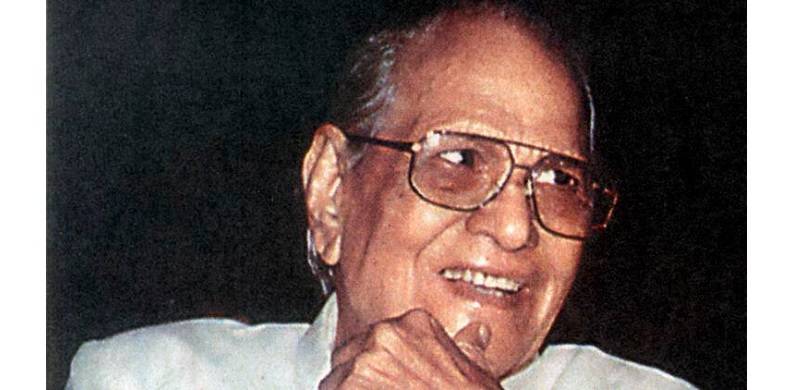
‘Majrooh, likh rahe hain vo ahl-e-vafaa ke naam
Hum bhi khade hue hain gunahgaar ki tarah
(Majrooh, the names of the faithful they write
Like a sinner, I await my name, quiet)
***
Asrar-ul-Hasan Khan ‘Majrooh’ (1919-2000) was born 102 years ago today in Sultanpur, and studied in relatively conventional settings, becoming a qualified Unani hakim, a career he gave up to become a full-time poet. He was also known to have been mentored by Jigar Moradabadi in his initial career. His high-risk career choice was to pay rich dividends; he became arguably the most successful poet of the progressive tradition after Sahir Ludhianvi, writing extensively for movies.
Majrooh’s leftist leanings were evident from the start, as was his lyricality. He combined both by writing exquisite ghazals in praise of socialist nations – the maqta or last couplet of one of his ghazals was:
‘Meri nigaah mein hai arz-e-Moscow, Majrooh/Vo sarzameen ke sitaare jise salaam karen’;
(‘My eyes are fixed on the horizon of Moscow, Majrooh/The land that is saluted even by the stars’
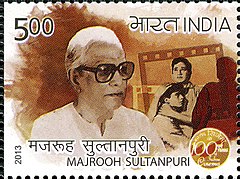 Despite his activism during the independence movement, Majrooh escaped incarceration in the pre-1947 phase. Ironically, he was jailed in 1949 (alongwith fellow leftist film-wala Balraj Sahni and fellow Progressive Writers Association member Ali Sardar Jafri, among others) by the government of newly independent India, which reflected the troubling reality of how newly independent nations devoured their socialists after decolonization.
Despite his activism during the independence movement, Majrooh escaped incarceration in the pre-1947 phase. Ironically, he was jailed in 1949 (alongwith fellow leftist film-wala Balraj Sahni and fellow Progressive Writers Association member Ali Sardar Jafri, among others) by the government of newly independent India, which reflected the troubling reality of how newly independent nations devoured their socialists after decolonization.
The ghazal that I have translated below is a tongue-in-cheek look at how lovers and revolutionaries bragged about their misfortune to mark their superiority.
‘Hum ko junoon kya sikhlaate ho, hum the pareshan tum se ziyaada
Chaak kiye hain hum ne azeezo, chaar garebaan tum se ziyaada
Chaak-e-jigar muhtaaj-e-rafoo hai, aaj to daaman sirf lahoo hai
Ek mausam tha, hum ko raha hai shauq-e-bahaaran tum se ziyaada
Ahd-e-vafaa yaaron se nibhaayen, naaz-e-hareefan hans ke uthaayen
Jab hamein armaan tum se siva tha, ab hain pashemaan tum se ziyaada
Jao tum apni baam ki khaatir saari laven sham’on ki katar lo
Zakhmon ke mehr-o-maah salamat, jashn-e-chiraaghan tum se ziyaada
Hum bhi hamesha qatl hue, aur tum ne bhi dekha door se, lekin
Ye na samajhna hum ko hua hai jaan ka nuksan tum se ziyaada
Zanjeer-o-deevaar hi dekhi tum ne to, Majrooh, magar hum
Koocha koocha dekh rahen hain aalam-e-zindaan tum se ziyaada’
(Do not teach me about passion, I’ve suffered hurt way more than you
I have torn in lost love, my friend, four more good shirts, way more than you
Wounded hearts demand repairing, my garment is red with my blood
Once there was a blighted autumn, when I sought spring way more than you
Faithful was I to well-wishers, and smilingly bore the betrayal of foes
More than you I was passionate; now I’m shamefaced way more than you
Hide behind your darkened secrets, cut the wicks off prying tapers
Yet, my wounds will light up the night: illumination way more than you
Though I was always killed in action, and you always watched from safety
Do not imagine that I suffered annihilation way more than you
Walls and chains were all you knew, but know this, Majrooh, even then
Every street is like a prison: incarceration way more than you.)
To do justice to Majrooh’s phenomenal success as a lyricist (he is, after all, the only lyricist to have won the 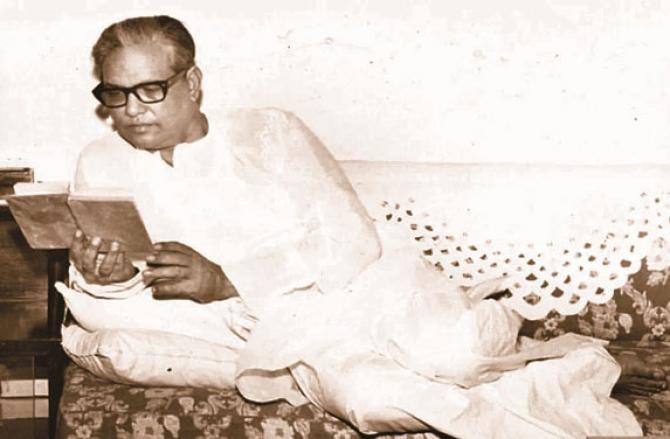 prestigious Dadasaheb Phalke Award), I also include a film song in this centenary tribute. His most popular songs were ‘Chahoonga main tujhe saanjh savere’ (from the 1946 Dosti), the execrable ‘Angrezi mein kehte hain ke I love you’ (from the 1982 film Khuddar) and ‘Papa kehte hain bada naam karega’ (from the 1988 film Qayamat se Qayamat Tak). I would, in good cricketing tradition, do a ‘well-left’ to all three. I have chosen the song ‘Ek din bik jaayega maati ke mol’ from the 1975 film Dharam Karam, especially since it truly showcases Majrooh’s lyrical ability, and simultaneously demonstrates how a song is different from a traditional poem.
prestigious Dadasaheb Phalke Award), I also include a film song in this centenary tribute. His most popular songs were ‘Chahoonga main tujhe saanjh savere’ (from the 1946 Dosti), the execrable ‘Angrezi mein kehte hain ke I love you’ (from the 1982 film Khuddar) and ‘Papa kehte hain bada naam karega’ (from the 1988 film Qayamat se Qayamat Tak). I would, in good cricketing tradition, do a ‘well-left’ to all three. I have chosen the song ‘Ek din bik jaayega maati ke mol’ from the 1975 film Dharam Karam, especially since it truly showcases Majrooh’s lyrical ability, and simultaneously demonstrates how a song is different from a traditional poem.
‘Ek din bik jayega, maati ke mol
Jag mein reh jayenge pyare tere bol
Dooje ke honton ko de kar apne geet
Koi nishani chhod, phir duniya se dol
Anhoni path mein kaante lakh bichhaaye
Honi to phir bhi bichhda yaar milaye
Ye birha, ye doori
Do pal ki majboori
Phir koi dilwala kahe ko ghabraye
Taram pam…
Dhara jo behti hai milke rehti hai
Behti dhara ban ja, phir duniya se dol
Ek din bik jayega, maati ke mol
Jag men reh jayenge pyare tere bol
Parde ke peeche baithi saanval gori
Thaam ke tere mere man ki dori
Ye dori na chhoote, ye bandhan na toote
Bhor hone wali hai ab raina hai thodi
Taram pam…
Sar ko jhukaye tu baitha kya hai yaar?
Gori se naina jod, phir duniya se dol
Ek din bik jayega, maati ke mol
Jag mein reh jayenge pyare tere bol’
(A day will come when you will be sold for the price of dust
Remember, all that will be left will be your poems, just
Donate your songs to strangers’ lips and they’ll keep you alive
Leave this eternal gift for them, and then move on you must.
Chance will strew a million thorns on your path till the end
While fortune will unite you with old forgotten friends
This autumn, this parting
A brief pain, a smarting
Why should the brave of heart be scared of fortune then?
Taram pum…
Watch when the river flows: many eddies, one thrust
Become the flowing stream, and then move on you must
A day will come when you will be sold for the price of dust
Remember, all that will be left will be your poems, just
Look, behind the curtains sits a brown beauty divine
She holds in her hands a string, controls your mind and mine
Let not that string break; let not that relationship fade
For it will soon be morning, and a harsh light will invade
Taram pum…
Don’t sit, bowing your head, my young friend robust
Lock eyes with that beauty, and then move on you must
A day will come when you will be sold for the price of dust
Remember, all that will be left will be your poems, just.)
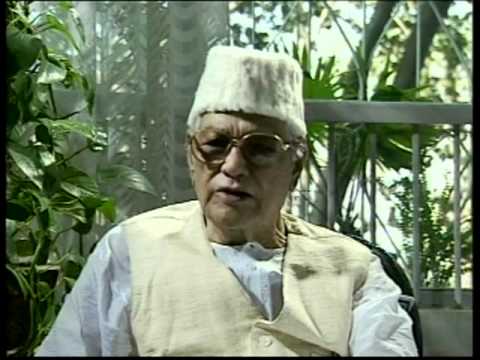 Qazi Abdul Ghaffar has introduced Majrooh in the following words:
Qazi Abdul Ghaffar has introduced Majrooh in the following words:
‘The sparks that are issuing from the fireplace of the young generation of India, a very bright spark among them is Majrooh Sultanpuri who has bared his soul in the ecstasy of versification. He is among those Progressive poets who say less (and perhaps for this very reason), say very well. In the field of ghazal he has done everything for which some Progressive poets deem only the style of poem to be essential and inevitable. Truly he has filled new wine into the new crystal of ghazal.’
All his ghazals wandered around in the circle of the cage, dungeon, chain and gallows, and it seems as if he dealt with only one kind of situation and known styles
As mentioned earlier, Majrooh’s poetic growth happened under the influence of Jigar and that was the reason he had such expertise over the art of ghazal. But if there is intoxication and fullness in Jigar’s temperament, then there is spiciness with Majrooh. That is why he had developed such colours in his style of versification which were only associated with him alone. The polish and sharpness to be found in his ghazals on political topics was the lot of just a handful of poets:
‘Dekh zindaan se pare rang-e-chaman, josh-e-bahaar
Raqs karna hai to phir paon ki zanjeer na dekh’
(Away from the dungeon are the colour of the garden, the force of spring, just glance
Do not consider the chain on the feet if you want to dance)
‘Men akela hi chala tha jaanib-e-manzil magar
Log saath aate gaye aur kaarvaan banta gaya
Main to jab jaanoon ke bhar de saghar har khaas-o-aam
Yoon to jo aaya vohi pir mughaan banta gaya
Dahr mein Majrooh koi javadaan mazmoon kahan
Mein jise chhoota gaya vo javadaan banta gaya’
(Alone I set off towards the destination
The caravan was created as the people joined in concentration
I will only recognize if the cup is filled by everyone high and low
He became the tavern-keeper, whoever came for visitation
Whither an eternal subject in the world Majrooh
He became immortal whoever we touched in perpetuation)
‘Ghairat-e-sang hai saqi ye guloo-e-tishna
Tere paimaane mein jo mauj hai talvaar sahi
Aane de baagh ke ghaddar mera roz-e-hisaab
Maange tinka na milega yahi gulzar sahi’
(This parched throat is the honor of the stone O cupbearer
A sword indeed is the wave in your measure
Let my day of judgement arrive o traitor of the garden
A garden indeed, for I will not ask for nor find a straw, ever)
‘Sar par havaa-e-sitam chale sau jatan ke saath
Apni kulaah kaj hai isi baankpan ke saath
Jhaunke jo lag rahe hain naseem-e-bahaar ke
Jumbish mein hai kafas bhi aseer chaman ke saath’
(Over my head moves with great effort the wind of terror
My cap is worn at an angle with the same curvature
The gusts which seem like spring breeze
The cage too moves with the garden taken prisoner)
‘Shab-e-zulm nighaa-e-raahzan pukaarta hai koi mujhe
Main faraz-e-daar se dekh loon kaheen kaarvaan-e-seher na ho’
(Someone calls me out from the robber’s trap on the night of oppression
I should see from atop the gallows lest it be the morning caravan)
‘Mujhe sahal ho gayeen manzilen vo havaa ke rukh bhi badal gaye
Tera haath haath mein aagaya ke chiraagh raah mein jal gaye’
(Destinations became easy, the winds too changed direction
Your hand came into mine in that lamps too burnt in the journey’s duration)
This intonation of Majrooh was the authentic intonation of Urdu versification in which new conditions were inserted while dispensing with the conventions of this genre. But after the manifesto of 1949, a few of his friends advised that this versification was useless for the masses and its symbols and metaphors were the product of the feudal era. So in this heat of loyalty, he tried a new experiment, to which the following two ghazals are a memorial:
1.) ‘Laal pharera is duniya mein sab ka sahara ho ke rahega
(The red banner which keeps us in thrall/Will one day be the support of the world’s all)
2.) Ye bhi koi Hitler ka hai chela maar le saathi jaane na paaye’
(He too is a servant of Hitler, serves him night and day/Finish him comrade, he should not get away)
But the manner in which Majrooh had abandoned the aesthetic values of his art for ‘people’s versification’ clarified its superficiality very soon. It had a biting manner and according to Rasheed Ahmad Siddiqui,
‘Wherever he deviates from the etiquettes of the ghazal, he becomes without rhythm to a ridiculous extent. Though Majrooh’s ghazals are very pleasing and at one time I used to be very happy thinking that he would reach a very high position among composers of ghazal going forward, but after reaching the Progressive circle he forgot this couplet of Ghalib
‘Paimaana baraan rind haram ast keh Ghalib
Dar be-khudi andaaza-e-guftaar nidand’
(A measure of wine is forbidden to the drunkard O Ghalib
He who does not know himself the size of his speech)
***
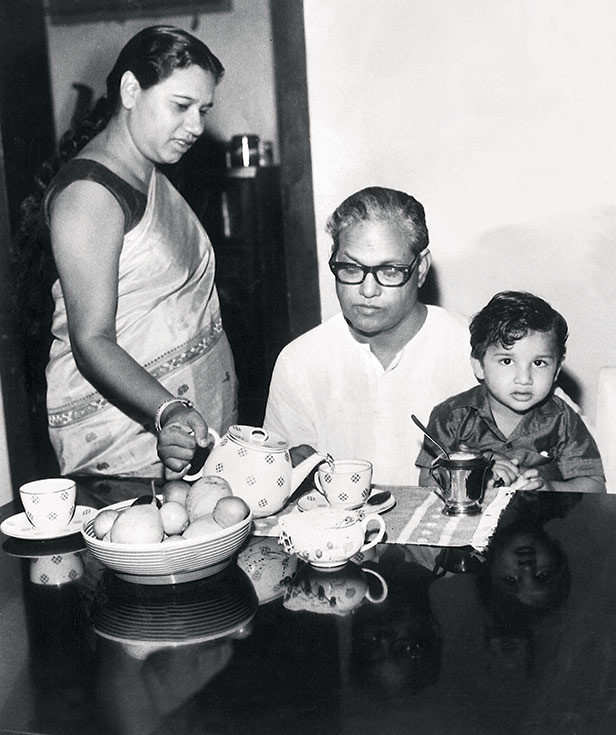
'I fear lest his end be like that of Yaas Changezi if he does not recover soon. If the poet bites me or you people will be entertained and will congratulate one another. But if he is prepared to bite poetry itself then what would his end be like.’
Thanks to God, Majrooh recovered soon enough and he revised this modus operandi of his. But having already marked his birth centenary back in 2019 and more than twenty years since he passed on this year, one deficiency of Majrooh kept rankling till the end; he never ventured out of the narrow place of political topics. All his ghazals wandered around in the circle of the cage, dungeon, chain and gallows, and it seems as if he dealt with only one kind of situation and known styles - and a voice already heard. If a poet does not enter the diverse realities of life and the widths of human emotions and feelings, then his ideas will shrink to be shut within a shell, and his art is not destined for fresh and open air and the hustle and bustle of the universe.
***
All translations from the Urdu are by the author. Raza Naeem is a Pakistani social scientist, book critic and award-winning translator and dramatic reader currently based in Lahore, where he is also the President of the Progressive Writers Association. He can be reached at: razanaeem@hotmail.com

